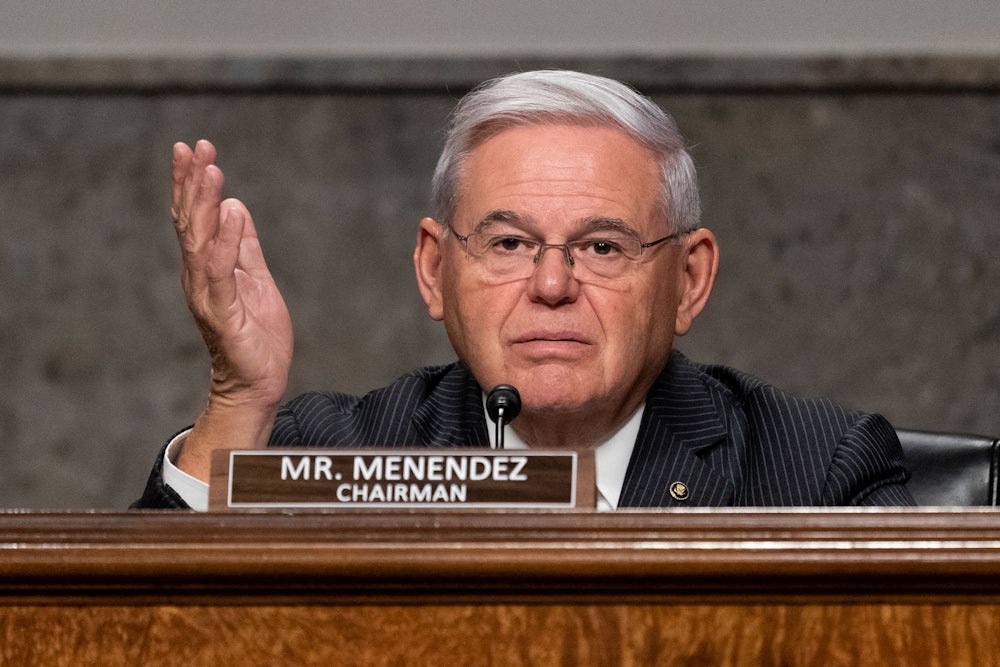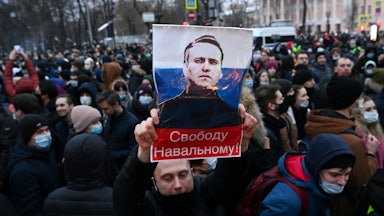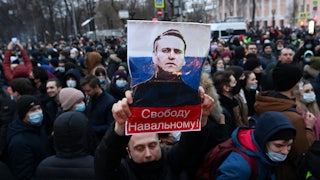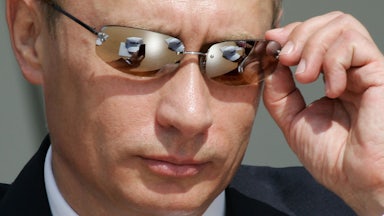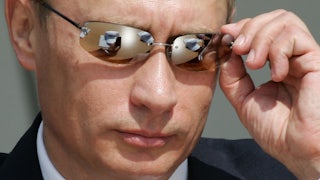With the Democratic agenda stalled, members of Congress are making the best of what’s around, taking bipartisan action on several key issues. Perhaps their most pressing concern at the moment is something worlds away from petty domestic debates that closed out the calendar year: taking action to deter Russia from launching an invasion of Ukraine. Senators on both sides of the aisle are largely in agreement that time is of the essence, though there’s still disagreement as to the best way to get Russian President Vladimir Putin to back down from his saber-rattling threats.
On Sunday, Senator Bob Menendez, the chair of the Senate Foreign Relations Committee, joined the Republican ranking member Senator Jim Risch in a joint CNN interview to report that lawmakers were on the “one-yard line” of negotiations for the “mother of all sanctions”—some of which would follow “later on” if Russian President Vladimir Putin decides to invade Ukraine; some of which “would come up front for what has been done already.”
“The devastating sanctions that ultimately would crush Russia’s economy, and the continuing lethal aid”—Washington’s popular new euphemism for weapons—“that we are going to send, means Putin has to decide how many body bags of Russian sons are going to return to Russia,” Menendez said. Risch added that if Russia invaded Ukraine, there would be sanctions to cripple Russian oil production.
Any sanctions that Congress imposes could complement action taken directly by the Biden administration. Biden told reporters on Monday that the United States is continuing to engage in “nonstop diplomacy,” but “we are ready no matter what happens.” Russia has amassed more than 100,000 troops on Ukraine’s border but is denying that it is planning an attack. Putin claimed on Tuesday that the U.S. was trying to pull Russia into a conflict that it did not want but said that he hoped “dialogue will be continued.” Russian officials have demanded pledges that Ukraine will never join NATO and a removal of NATO troops and weapons from Eastern Europe.
The president can take action without Congress to sanction Russia, and the White House has already threatened robust sanctions should an invasion take place. White House press secretary Jen Psaki said Monday that the administration had developed “specific sanctions packages for both Russian elites and their family members” who are “in or near the inner circle of the Kremlin and play a role in government decision-making.”
The role that Congress plays may therefore be bolstering the president’s credibility as he attempts to deter Putin. These actions would be in concert with sanctions from allies, as well. Christopher Miller, the assistant professor of international history at the Fletcher School of Law and Diplomacy at Tufts University, said that any congressional action would give the Biden administration credibility to “go to the outside world and say, ‘We’ve got bipartisan domestic backing for a pretty tough sanctions package.’”
“The reality is that the administration already has all the authority it needs to do most of what’s being discussed right now in terms of sanctions,” Miller said. “So my view is that what Congress is doing is actually more impactful in terms of signaling to Russia and to allies and financial markets.”
Republican Senator Rob Portman, a member of the Foreign Relations Committee, said that negotiations over sanctions on Russia were focused on “ensuring that here in Congress, we have a strong bicameral and bipartisan message to the people of Ukraine and to Vladimir Putin and the Russians that … we stand with Ukraine.”
“What Russia is already doing is considered to be subject to sanctions now, and should they make a big mistake and actually invade Ukraine the consequences would be devastating,” Portman said.
But whether or not to impose sanctions on Russia even before Putin makes a decision is a significant point of contention among senators. The Senate last month voted down a measure proposed by Senator Ted Cruz to sanction Russian entities associated with the controversial Nord Stream 2 pipeline running from Russia to Germany. Although some Democrats supported Cruz’s bill, most did not, and the measure failed to clear the 60-vote threshold to avoid a filibuster; it was also opposed by the White House, which argued that it would undercut deterrence measures. Menendez has proposed a bill that would impose sanctions related to Nord Stream 2 only if Russia invaded Ukraine.
Menendez said on Tuesday that Congress was close to reaching a deal on sanctions but that the remaining sticking points were over “pre-invasion” sanctions and Nord Stream 2. He said that there was “concern” from the White House about imposing sanctions before Putin made a decision, “especially as they try to keep the unity of the international community together.” Menendez later told reporters that European allies believed sanctions should be imposed after an invasion, due to concerns about provoking Putin. But he also said that any “upfront” sanctions would be less severe than the ones that would be implemented if Russia decided to invade.
The White House and Democrats worry that imposing sanctions before Putin decides to invade Ukraine may counteract any deterrence. If Putin believes he will be sanctioned whether or not he decides to launch an invasion, that may actually push him to escalate the conflict.
“Imposing some sanctions now might actually obscure that message, make it less clear to the Russian leadership that if they do go in, they’re going to face really tough sanctions. [But] if they don’t go in now, they won’t face tough sanctions, which might help possibly to shift decision-making in the Kremlin,” Miller said.
Senate Democrats on the Foreign Relations Committee voiced concern about imposing pre-invasion sanctions on Russia, even as they acknowledged that Putin has already taken actions worthy of a response. “Putin and Russia have already engaged in aggressive enough behavior to justify some sanctions, but we should reserve the toughest and strongest sanctions as a deterrent against further invasions,” Senator Chris Coons told The New Republic on Tuesday.
“We should create as much jeopardy for them as possible so that they know that there’ll be a real serious consequence should they make their move. I think putting sanctions on them now actually could create a situation where they see less of a cost,” said Senator Cory Booker. But Booker deferred to Menendez, the senior senator from New Jersey, and said there was “a lot of common ground” between Republicans and Democrats on the issue.
Senator Chris Murphy said that while he agreed with the White House that sanctions should be applied after an invasion, he believed there was room for agreement between Republicans and Democrats. “If you want to compromise, you have to compromise. So if you want to deal with Republicans on Russia sanctions, then you’re gonna have to address some of their priorities,” Murphy said.
Republican Senator John Cornyn argued that Putin’s decision-making would not be influenced by pre-invasion sanctions. “Putin is motivated by his own desire to reestablish the old Soviet Union,” Cornyn said, explaining that he therefore had “no fear or no concern” about potential provocation. (Cornyn told reporters on Monday that his proposal to set up a lend-lease agreement with Ukraine would likely be included in the final sanctions package, the first time such a program would be implemented since World War II.)
While senators fret over how to address Nord Stream 2, Miller argued that the pipeline was maybe less of a priority for Russia than it is for Congress. Ultimately, a war between Russia and Ukraine and the accompanying sanctions would cost more for Russia than losing the pipeline. (While the pipeline has been built, Germany suspended its certification process for the project last year.)
“I think in economic, energy, and financial terms, it’s a lot less important than the U.S. thinks,” Miller said, calling the pipeline a “second-tier issue.” “I think Congress ought to spend more time providing as much clarity as possible on the message over financial-sector sanctions, which are the ones that really matter.”
